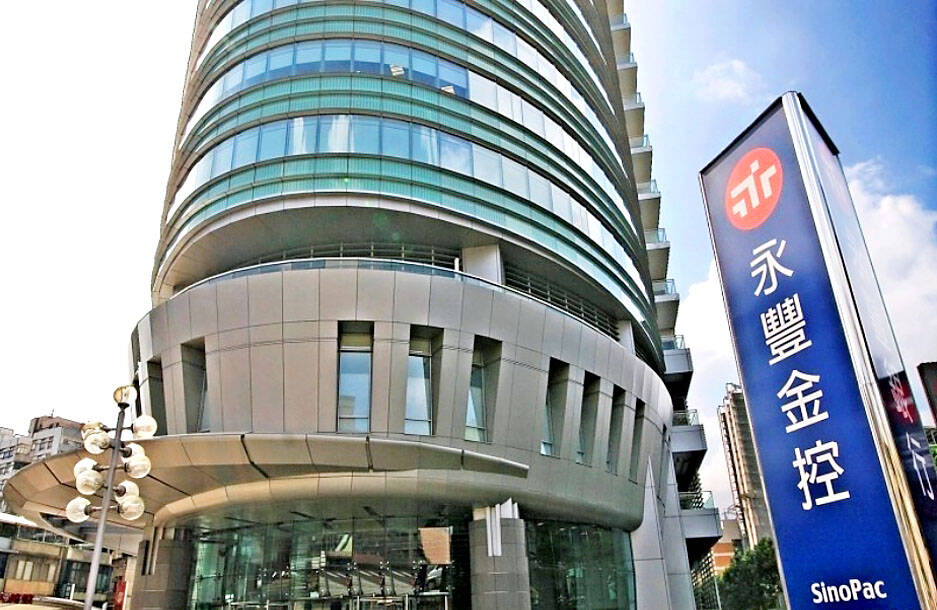The Financial Supervisory Commission (FSC) yesterday fined SinoPac Financial Holdings Co (永豐金控) NT$10 million (US$308,356) and cut its chairperson’s salary over poor internal controls and failure to comply with corporate governance requirements.
The company’s management team was found to have invited major shareholder and former chairman Ho Shou-chuan (何壽川) to attend two meetings about its medium and long-term strategic planning in August and September 2021, Banking Bureau Deputy Director-General Phil Tong (童政彰) said.
During the meetings, Ho was briefed by executives of the company and its subsidiaries about their business plans, Tong said, citing a routine commission inspection of SinoPac Financial.

Photo: Kelson Wang, Taipei Times
No reports or meeting documents were kept, he added.
Ho stepped down as chairman at SinoPac Financial in June 2017 after the company was found to have engaged in a series of loans via its banking and leasing units without adequate collateral and documentation.
Being a founder of SinoPac Financial, Ho still owns a substantial stake in the company, but he should receive information from his representatives on the board, rather than directly from management, as he is no longer in charge of the company, the commission said.
“The company has three major deficiencies: poor corporate governance, a lack of internal controls and failure to properly manage subsidiaries,” Tong said.
The commission also cut SinoPac Financial chairwoman Chen Shi-kuan’s (陳思寬) salary by 30 percent for six months for her failure to supervise the company, and imposed the same salary cut on Liao Shun-hsin (廖順興), head of the company’s legal department, for three months for contravening corporate governance requirements, it said.
The commission since last year has fined Shin Kong Financial Holding Co (新光金控), China Development Financial Holding Corp (中華開發金控) and CTBC Financial Holding Co (中信金控) NT$20 million to NT$40 million after their major shareholders were found to have improperly intervened in company operations.
To help stop major shareholders from improperly interfering in the operations of financial holding companies and banks, the commission this month submitted proposed amendments to the Financial Holding Company Act (金融控股公司法) and the Banking Act (銀行法) to the Executive Yuan for review, hoping the draft legislation would be deliberated in the legislature as soon as possible.
However, the commission has watered down penalties in its proposal, saying it hopes the legislation would advance smoothly and achieve its policy goals in stages.
Some have asked whether there is external pressure ahead of January’s presidential and legislative elections, but FSC Chairman Thomas Huang (黃天牧) denied there was any such factor at play at a meeting of the Legislative Yuan’s Finance Committee yesterday.

BYPASSING CHINA TARIFFS: In the first five months of this year, Foxconn sent US$4.4bn of iPhones to the US from India, compared with US$3.7bn in the whole of last year Nearly all the iPhones exported by Foxconn Technology Group (富士康科技集團) from India went to the US between March and last month, customs data showed, far above last year’s average of 50 percent and a clear sign of Apple Inc’s efforts to bypass high US tariffs imposed on China. The numbers, being reported by Reuters for the first time, show that Apple has realigned its India exports to almost exclusively serve the US market, when previously the devices were more widely distributed to nations including the Netherlands and the Czech Republic. During March to last month, Foxconn, known as Hon Hai Precision Industry

Taiwan Semiconductor Manufacturing Co (TSMC, 台積電) and the University of Tokyo (UTokyo) yesterday announced the launch of the TSMC-UTokyo Lab to promote advanced semiconductor research, education and talent development. The lab is TSMC’s first laboratory collaboration with a university outside Taiwan, the company said in a statement. The lab would leverage “the extensive knowledge, experience, and creativity” of both institutions, the company said. It is located in the Asano Section of UTokyo’s Hongo, Tokyo, campus and would be managed by UTokyo faculty, guided by directors from UTokyo and TSMC, the company said. TSMC began working with UTokyo in 2019, resulting in 21 research projects,

Ashton Hall’s morning routine involves dunking his head in iced Saratoga Spring Water. For the company that sells the bottled water — Hall’s brand of choice for drinking, brushing his teeth and submerging himself — that is fantastic news. “We’re so thankful to this incredible fitness influencer called Ashton Hall,” Saratoga owner Primo Brands Corp’s CEO Robbert Rietbroek said on an earnings call after Hall’s morning routine video went viral. “He really helped put our brand on the map.” Primo Brands, which was not affiliated with Hall when he made his video, is among the increasing number of companies benefiting from influencer

Quanta Computer Inc (廣達) chairman Barry Lam (林百里) yesterday expressed a downbeat view about the prospects of humanoid robots, given high manufacturing costs and a lack of target customers. Despite rising demand and high expectations for humanoid robots, high research-and-development costs and uncertain profitability remain major concerns, Lam told reporters following the company’s annual shareholders’ meeting in Taoyuan. “Since it seems a bit unworthy to use such high-cost robots to do household chores, I believe robots designed for specific purposes would be more valuable and present a better business opportunity,” Lam said Instead of investing in humanoid robots, Quanta has opted to invest